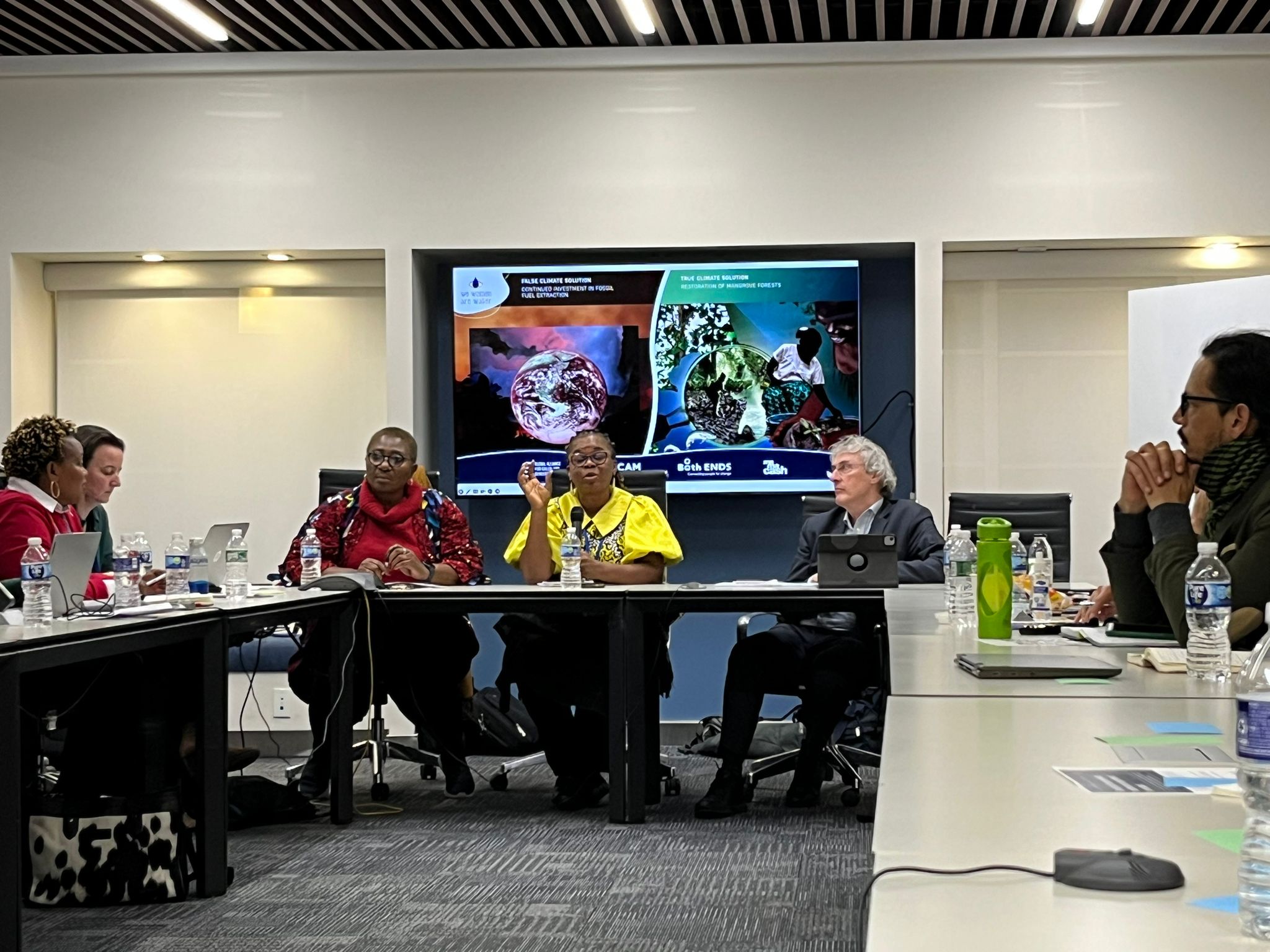UN Water Conference Side-Event Highlights

The GAGGA side event during the UN Water Conference on March 23rd was a resounding success. The session brought together government representatives, philanthropic donors, civil society organisations, women environmental human right defenders from Nepal, Kenya, Paraguay, Mexico, and Nigeria, and others, to discuss finance and support for gender just water and climate solutions.
The event was hosted by GAGGA with the support of the Government of Chile and Women Engage in a Common Future (WECF). The panelists included Pilar Andrea Barria Sandoval, Advisor for Water at the Ministry of Environment of Chile, Omer van Renterghem, Theme Expert Land, Water and Ecosystems in the Inclusive Green Growth Department at the Ministry of Foreign Affairs of The Netherlands, and Dr. Bapon Fakhruddin, Water Resources Management Senior Specialist, Division of Mitigation and Adaptation, Green Climate Fund. Dr. Priscilla Mbarumun Achakpa from Women Environmental Programme Nigeria, moderated the session.
During the event, GAGGA presented their commitment to supporting, financing, and promoting locally rooted, gender just climate and water solutions within the Water Action Agenda (the collection of all water-related voluntary commitments made at the UN Water Conference). One of the highlights of the event was the inspiring stories shared by the local women environmental human rights defenders as part of the We Women Are Water Campaign. They presented innovative solutions that address the challenges faced by their communities, including from the impacts of climate change and large-scale monoculture or fossil fuel projects, and their lack of access to safe and clean water. The panelists and speakers emphasized the importance of supporting and funding gender just water and climate solutions to ensure water security and a sustainable future for all.
Bernarda, from the Qom community of Paraguay, spoke about the impact of eucalyptus tree plantations on her community: “We feel the consequences of single crop planting of eucalyptus trees. They consume a lot of water and take up a lot of space. And they need large amounts of fertilizers. Our territory becomes contaminated. This affects our groundwater and health.” Bernarda highlighted the need to promote reforestation and native fruit trees, as well as to support women’s organizations with access to funds for community and environmental self-management.
Dr. Bapon Fakhruddin from the Green Climate Fund responded to this story by agreeing on the importance of maintaining the natural ecosystem, and by sharing some of the Green Climate Fund (GCF) policies, including the gender and indigenous people’s policy of the GCF, which are aimed at avoiding negative impacts from GCF projects.
Martha, from Nigeria Lokiaka Community Development Center, expressed gratitude for the support provided by GAGGA and others in the face of environmental challenges in the Niger Delta. She highlighted the negative impact of fossil fuel extractive industries and pollution on the ecosystem and livelihoods of those living in the Niger Delta. Martha presented their initiative to train local women in planting mangroves as a solution to sequester CO2 and restore biodiversity in the area. “Now we see the return of biodiversity. Water has improved. Birds are coming in and even fishes that we were missing before.” She called for justice in the transition after divestment from fossil fuel extraction and asked for support in promoting gender-just climate and water solutions.
During the discussion, Omer van Renterghem suggested several ways the Ministry of Foreign Affairs of the Netherlands could help find support or contribute to further mangrove restoration in Nigeria, including exploring policy opportunities and public-private partnerships. He also highlighted the role of wetlands in promoting environmental and climate benefits, stating, “The role of wetlands is now getting more international attention. Wetlands have a triple win: it’s good for the environment, good for climate, and good for people.”
Indira from INWOLAG in Nepal shared how the Magar Indigenous community is affected by the Tanahu hydropower project. The project, financed by the Asian Development Bank, the European Investment Bank and the Japan International Cooperation Agency without consent of the community, has devastating effects including exposing 60% of the Magar residents to the loss of their farmland, 11.000 trees and nine cremation sites. Moreover it’s impact puts the community at greater risks of natural disasters related to the climate crisis such as floods and droughts. For centuries the community has maintained a symbiotic relationship with nature, passing down traditional ecological knowledge for generations such as planting broom grass to prevent soil erosion and landslides.
Pilar Andrea Barria Sandoval shared how the Chilean government takes a feminist approach to programming and policy making and stated, “The Government of Chile is committed to promoting gender equality in water management, recognizing the vital role of women in decision-making processes for the sustainable use of water resources.” Chile made an official commitment in the Water Action Agenda reflecting this.
Overall, the speakers and audience emphasized the need for a contextualized and gender just approach to water management and governance that takes into account the diverse needs of different communities and ecosystems from the design phase to actual implementation. The GAGGA side event during the UN Water Conference was a valuable and inspiring session that highlighted the critical role of gender just water and climate solutions in achieving climate and water justice . The event showcased innovative solutions from indigenous women and emphasized the urgent need of funding and supporting these initiatives.
We want to thank our panelists and moderator and all attendees for this memorable session. Let us continue to champion the cause of finance for gender-just climate and water solutions, as we work towards a future that is sustainable, equitable, and just for all.



